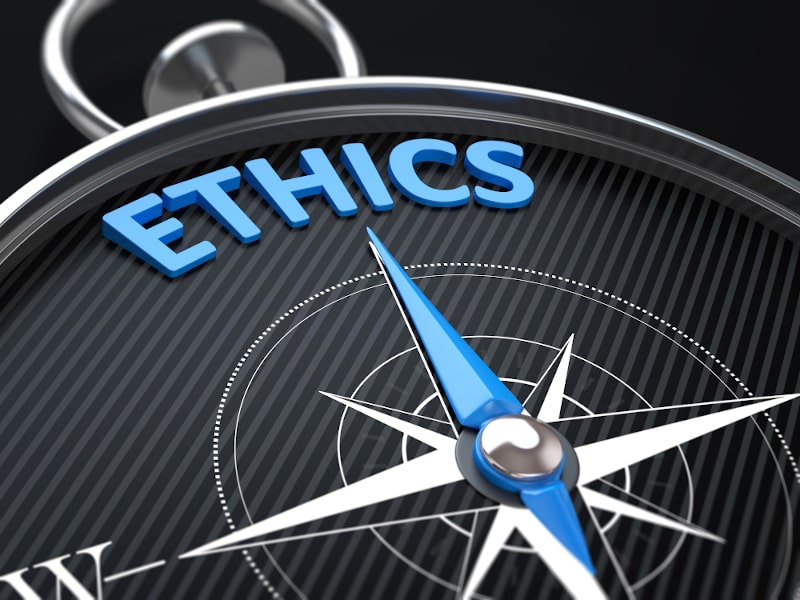The SEO Code of Ethics: What Is It? Why Does It Matter? What’s Included?

Search engine optimization is not a static discipline. As time goes on, shifts on the Internet demand that the process of SEO change. In many ways, those advances are great. At other times, they require that we address issues that we never considered before, including the matter of ethics.
That's led us to a place in 2019 where we talk about the need for some sort of code of ethics for SEO. The idea of ethical codes is nothing new. They're found in just about any type of organization that one can imagine. Guidelines for ethical marketing, business structure, and sales practices are all around us. Does it seem so odd that many find the need for some type of code of ethics for search engine optimization to be so important?
So what does it mean to have an ethical code related to SEO? What should it accomplish? Are there elements of SEO that need to remain outside the scope of ethical guidelines, or should it be all-inclusive? Will it shift when Google and other search engines find it necessary to adjust their algorithms?
These are all questions that SEO experts are seeking to answer right this minute. If you're interested in making your digital footprint the best it can be, that's cause enough to join the conversation about an SEO Codes of Ethics.
A Working Definition

A good place to begin any meaningful discussion about a search engine optimization code of ethics is to develop a working definition. For purposes of this discussion, let's go with something that has an international flavour, is easy to understand, fits in neatly with just about any organization, and includes some elements that most ethical companies include in as basic policy and procedure.
Ethical SEO has to do with establishing a code of principles that govern the conduct of those who engage in specific activities. In this case, it's engaging in the business of search engine optimization. The goal is to develop something that's easy to understand and broad enough to apply to most if not all aspects of SEO. Ideally, the code provides a basis for utilizing methods that meet the standard of being ethical.
What's The Reason Behind a Search Engine Optimization Code of Ethics?
Ethical search engine optimization protects the confidentiality of the client, observes copyright laws, and seeks to build a brand using ethical methods. This is key in terms of building a brand that's perceived as being trustworthy. Even with recently implemented changes to search engine algorithms, a basic set of ethical standards provides a foundation for pursuing higher rankings without resorting to methods that are somewhat suspect. When utilized appropriately, reputations are protected and even flourish in a positive manner.
What's Meant by White Hat and Black Hat in Terms of Ethical SEO?
Discussions of ethical SEO are bound to bring up the topics of white hat and black hat strategies. Some may also refer to gray hat methods, but for now let's stick with white and black. This more basic approach will make it easier to consider more complex issues later on.
White hat refers to search engine strategies that are currently looked upon with favour by major engines like Google and Bing. They are free of any violation that could cause a page to lose rank. There's full compliance with current laws, careful management of traffic using ethical approaches, and in general keeping the competition aspect of SEO within reasonable ranges.
Black hat refers to the use of methods that are capable of generating a lot of traffic, at least until the search engines catch on. They are intentional strategies that are not concerned with the quality of what users read or even if they get anything from the experience. It's all about generating sales or at least as many clicks and pass-throughs as possible. Some would call it a manipulation of technology at the expense of ethical activity.
Here's something to remember about white hat and black hat search engine optimization. Some approaches that are considered black hat today were perfectly accepted 15 years ago. There's every reason to think that some methods that are considered white hat today may be labeled as black hat a decade from now. As SEO continues to evolve, what is ethical today may be unthinkable tomorrow.
The fact that what's ethical today could change tomorrow is all the more reason to think about developing a search engine optimization code of ethics. It must be flexible enough to adapt to a changing online landscape while while still providing a basis for defining a practice as ethical. That's not always as easy as it may seem.
Who Would Be Affected by the Code?
Everyone who uses the Internet is directly or indirectly affected by an online ethics code. That's because it has some impact on all sorts of privacy concerns, contact options, needs of consumers, and the expectations of business owners and customers alike.
Working techniques that address ethical concerns and practices encompass it all. It affects the sale of any good or service. Ethics impact the gathering of resources, cataloging them in directories, and even how they are related to one another. SEO ethics do not have to limit responsible choice. The plan is not to make it harder for businesses to sell online. SEO's primary purpose is to make reaching known consumer bases which are likely to want what you have to offer easier. Be if for the home or the office, rest assured ethical conduct with SEO touches you.
This includes conducting a full SEO audit of any site already vetted by a different firm. The goal is to look at it with fresh eyes, determine what's in line with current search engine requirements, and what needs to be changed.
Elements That Must Be Part of Any SEO Code of Ethics
A workable SEO ethical code will apply to every element of your online presence. That includes your blog, your website, your store, and your social media. While the nature or purpose of any one of these may be a little different, the same set of SEO ethics would apply. In a sense, they help to provide your company with a more cohesive presence across the board. How you present yourself on Facebook, Twitter, Instagram, and every other area of the Internet will build trust, provide helpful information, and in general provide something of value to your audience.
So what are the basics that need to be part of any SEO ethics code? Consider these five that form the basis for our Seologist Code of Ethics:
1. We Will Never Intentionally Harm Any Client
That's the guiding light of any plan for SEO ethics. Every action taken on behalf of a client must have the intended purpose of enhancing reputation, encouraging the sharing of useful information, and in general increasing the positive reputation of that client. Along the way, those efforts should also give search engines a valid reason to rank those pages higher in the results.
2. We Will Remain Up to Date on Search Engine Rules and Not Violate Them
Continuing education is a must for anyone who engages in SEO on any level. Search engines can and do release major changes in their algorithms. They also adapt algorithms in what appear to be minor ways on a regular basis. That makes keeping up with the latest changes essential.
Fortunately, most search engines are transparent about what's expected in terms of compliance. That makes it easier for SEO experts to refine how they serve their clients when and as the need arises. A dedication to working within the rules and guidelines must be part of the ethics code.
3. We Will Not Intentionally Mislead Any Internet User
The concept of truth in advertising applies to all online content. Whether it's a blog article, a social media post, or a pop-up ad, ethical standards require that everything from the title to the meta description to the content be correct, to the point, and free of any attempts to mislead or misinform a reader.
In short, any reader who's attracted by a headline or a description must find the content associated with the page to be on topic and filled with correct data. Even links embedded in the content will be on point and provide value. Any attempts to side track or slip something in that's not relevant to the page content is not acceptable.
4. We Will Not Represent The Work of Others As Our Own
The days when most search engines didn't care about duplicate content are long gone. Now the result of using that strategy is likely lower rankings for the original page and the page where the copied content resides. Repeated offenses could lead to de-indexing those pages. That's not good for the client.
Remember that concepts and ideas can be presented in multiple ways. Choosing to articulate those ideas in a new way helps provide freshness and typically attracts positive attention from the search engines. It's also likely to capture the attention of readers too.
5. We Will Not Sacrifice the Commitment to One Customer in Order to Benefit Another Client
As with a traditional advertising agency, SEO firms cannot reasonably be expected to only help one company per industry. What firms can do is ensure both clients receive the amount of attention they need. Equal efforts to utilize SEO to promote those clients is a must. Proprietary information shared with the firm shall be guarded closely. From the client perspective, things continue as if that client is the firm's only customer.
Will some of these five basic elements change in the future? Possibly the exact application will change, but the underlying concepts will remain. Implementing all of these with any SEO project ensures that integrity, purpose, and strategies are always designed to gain favour from the search engines and benefit the client. Consider each one carefully, and consider how they can be more fully implemented today. The effort is well worth it.
